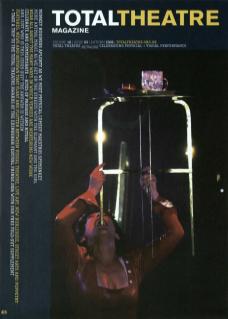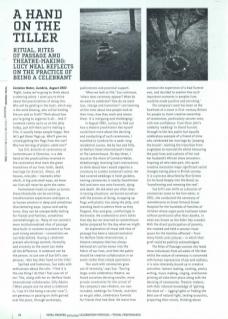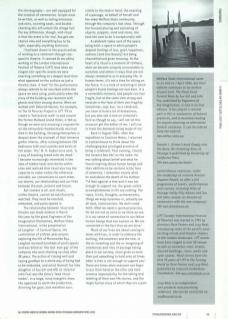Coniston Water, Cumbria, August 2002
‘Right, today we're going to think about scattering ashes. I want you to think about the practicalities of doing this. Who will be getting in the boat, which way is the wind blowing, who will be holding the urn and so forth? Think about how you're going to organise it all... And if someone comes up to us on the jetty today, just tell them you're making a film, it usually keeps people happy. Now let's get these flags up. Who'll give me a hand getting the flags from the van? Who has the bag of plastic cable ties?'
Sue Gill, director of ceremonies at Lanternhouse in Ulverston, is a dab hand at the practicalities involved in the ceremonies that mark the great transitions of our lives: birth, death, marriage (or divorce), illness, old houses, new jobs – moments after which, in big and small ways, we know our lives will never be quite the same.
Formalised rituals to usher us across these thresholds can be enriching, transformative experiences and open us to human emotion in deep and sometimes disorientating ways. Joyous and sad by turns, they can be unexpectedly testing for friends and families, sometimes overwhelmingly so. Many of our society's more institutionalised rites of passage have built-in customs to protect us from such strong emotions – conventions we can hide behind. Having a celebrant present who brings warmth, formality and sincerity to the event can make all the difference. A celebrant can be the person, to use one of Sue Gill's own phrases, 'who has their hand on the tiller'.
Spirited and humorous, Sue talks with enthusiasm about the role: 'I find it is the one thing I do that I feel uses all of me.' She, along with her ex-Welfare State International collaborator, Gilly Adams (‘When people ask me what a celebrant is, I say it's like being a secular vicar'), are generous in passing on skills gained over the years, through workshops, publications and practical support.
‘When we look at life,' Sue continues, 'where does ceremony appear? What do we want to celebrate? How do we mark loss, change and transition? I am learning all the time about how people look at their lives, how they mark and assess them. It is intriguing and challenging.’
In August 2002, curious to find out how a theatre practitioner like myself could learn more about the devising and conducting of such ceremonies, I travelled to Cumbria for a week-long residential course, led by Sue and Gilly, at Welfare State International's home at The Lanternhouse. On day three, I stood on the shore of Coniston Water, disbelievingly receiving Sue's instructions to think about how I would organise a ceremony to scatter someone's ashes. We had covered weddings in hotel gardens, naming ceremonies in nearby Swarthmoor Hall and were now onto funerals, dying and death. We did what one often does in testing situations: we busied ourselves with the process of doing, strapping up flags with plastic ties along the jetty, and standing back to admire them as they flapped, lilac and grey, comfortingly in the breeze. We scattered no one's ashes that day but we returned to Lanternhouse better prepared for the day when we might.
An exploration of ritual and rites of passage has been a natural evolution for Welfare State International, a theatre company that has always believed art can be woven into the fabric of our lives, and that the public should be creative collaborators in an event rather than simply spectators.
‘Our work with ceremonies grew out of necessity,' says Sue. 'Touring large-scale celebratory theatre, we found ourselves devising smaller, more private ceremonies for the arrival of the company's new children, our own included, weddings for friends, and then as we got older, celebratory funerals for friends that had died. We learnt how common the experience of a bad funeral was, and decided to explore how such important moments in peoples lives could be made positive and enriching.’
The company's work has been at the forefront of a move in 21st Century Britain for people to claim creative ownership of ceremonies, particularly secular ones, with new confidence. From Elton John's celebrity 'wedding’ to David Furnish, through to the less public but equally celebratory example of a friend of mine who celebrated her marriage by 'jumping the broom': marking the transition from singledom to married life whilst honouring the past lives and customs of her and her husband's African slave ancestors. Inspiring all who take part, this quiet creative revolution maps significant social changes taking place in British society. It is a process described by Ron Grimes (in his book Deeply into the Bone) as 'transforming and renewing the real'.
Sue Gill's own skills as a director of ceremonies came to the fore when, in 2001, she conducted the ceremony of remembrance at Great Ormond Street Hospital for the hundreds of families of children whose organ parts had been taken without permission after their deaths, in what was known as the Alder Hey scandal. With the direct participation of parents, she created and held a secular ritual space for the families affected from many faiths and cultures – in which their grief could be publicly acknowledged.
The Rites of Passage courses she leads show individuals from all walks of life that whilst the nature of ceremony is concerned with human expressions of joy and sadness, it is also inherently bound up in creative activities: lantern making, cooking, poetry writing, music making, singing, and banner printing all take their place along with the devising of ceremonies. Theatre-makers, with their inherent knowledge of getting the show on – rigging lights or finding the best use of natural light, testing acoustics, projecting their voices, thinking about the choreography – are well equipped for the creation of ceremonies. Scripts must be written, as well as noting entrances and exits, counting seats, and double-checking who will unlock the village hall. The key difference, though, with ritual is that the event is for real. You get one chance only and everything has to be right, especially anything technical.
I had been drawn to the practicalities of working as a celebrant through site-specific theatre. It seemed to me whilst working at the London International Festival of Theatre (LIFT) that when we staged site-specific events we were enacting something at a deeper level than what appeared on the surface as just a theatre show. A 'text' for the performance always seemed to be inscribed within the space we were using, particularly when the story of the building was resonant with ghosts and their unsung stories. When we worked with Deborah Warner, for example, on The St Pancras Project in LIFT '95 to create a 'fantastical walk' in and around the former Midland Grand Hotel, it felt as though we were also enacting a requiem for all the exhausted chambermaids who had died in the building, throwing themselves in despair down the stairwell of that immense gothic interior, after running between 250 bedrooms with coal scuttles and bowls of hot water. 'Art,' W. H. Auden once said, 'is a way of breaking bread with the dead’ I became increasingly interested in the idea of hidden texts and stories within sites and realised that ritual also has the capacity to make visible the otherwise invisible: our connections to each other, our stories, our relationships and our links between the past, present and future.
But context is all, and rituals, unlike theatre, cannot be satisfactorily watched. They must be enacted, embodied, and participated in.
The relationship between ritual and theatre was made evident in March this year by the great Engineers of the Imagination themselves, Welfare State International, in the presentation of Longline - A Carnival Opera, the culmination of a three-year project exploring the life of Morecambe Bay, Longline involved hundreds of participants and was billed as the ‘last-ever gig' of the company who were shutting up shop after 38 years. The action of closing well and saying goodbye to a whole way of being had to be embodied, and artist Hannah Fox (the daughter of Sue Gill and WSI co-director John Fox) was the show's 'lead ritual-maker'. In a large, noisy energetic show, she appeared to earth the production, directing her gaze, and therefore ours, calmly to the task in hand: the enacting of a passage, on behalf of herself and the wider Welfare State community, through the company's last show. Through the focused placing and animating of objects, puppets, sand and stone, she took the care to do it exceptionally well.
A celebrant takes care of the space being held: a space in which people's deepest feelings of loss, grief, happiness, sadness (and also beauty) are being channelled and given meaning. At the heart of a ritual is a moment of stillness, when we become uniquely accountable to ourselves and others in ways that are not always revealed to us in everyday life. In human terms, it's not a time for sitting on the fence. It is a kind of reckoning in which people's truest feelings are laid bare. It is a vulnerable moment, and people can feel fragile, but at the same time strong and resolute in the face of their own fragility. Sometimes, says Sue, 'as a celebrant, you have to hold a lot of brokenness, but you also see a look on someone's face as though to say, I will not let this occasion get the better of me. I will rise to meet the demands being made of me.'
Back in August 2002, after the expedition to Coniston Water, I returned to Lanternhouse to think about the challenging but privileged practice of being a celebrant. That evening, I heard the novelist Ben Okri on the radio. He was talking about belief and what he found inspiring about human beings and their abilities to be resilient in the face of adversity. I remember clearly what he said about the death of his mother: ‘I'd lean against a tree and it was not enough to support me. Our great visible accomplishments in life are nothing. The ropes, tricks, thoughts, achievements, things we wrap ourselves in, actually are all dust, constructions. We don't need faith. What we need is spiritual practice, for we are not as solid as we think we are. It is our sense of connection to our fellow human beings that can sustain us. We are connected in the fact that we are alive.’
Much of our lives are about coming to terms with loss, in order to embrace the exciting, the uncertain and the new. In the reinventing and the reimagining of ceremonies and rites of passage taking place in our society, ritual gives us more than just something to hold onto at times when ‘a tree is not enough to support you'. These are times when everyone can begin to put their hand on the tiller and take creative responsibility for the telling and retelling of their own life stories, and the larger human story of which they are a part.
Welfare State International came to an end on 1 April 2006, but their website continues as an archive of past work. The Dead Good Funeral Book by Sue Gill and John Fox, published by Engineers of the Imagination, is now in its 2nd edition. It has played a seminal part in the re-evaluation of funeral practices, and is essential reading for anyone planning an alternative funeral ceremony. It can be ordered from the website: www.welfare state.org
Ronald L. Grimes' book Deeply into the Bone: Re-Inventing Rites of Passage is published by University of California Press. See www.ucpress.edu/books
Lanternhouse continues, under the leadership of creative director Stephen Powell, to offer a full programme of events, performances and courses, including Rites of Passage led by Gilly Adams and Sue Gill (who remains as director of ceremonies with the new company). See www.lanternhouse.org
LIFT (London International Festival of Theatre) was started in 1981 by directors Rose Fenton and Lucy Neal. Introducing some of the world's most exciting artists and theatre-makers to the London landscape, LIFT events have been staged in over 30 venues as well as numerous sites: streets, disused buildings, rivers, parks and open spaces. Read stories from the first 25 years of LIFT in The Turning World by Rose Fenton and Lucy Neal, published by Calouste Gulbenkian Foundation. See www.centralbooks.co.uk
Lucy Neal is an independent arts producer and practising celebrant. She can be contacted on: Lucy@lucyneal.co.uk


